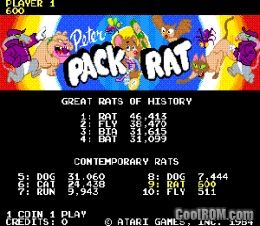An anonymous reader writes to point out a: a, playable in your browser using. From the blog post announcing this extension of the already mind-blowing Internet Archive: 'Like the Historical Software collection, the Console Living Room is in beta – the ability to interact with software in near-instantaneous real-time comes with the occasional bumps and bruises. An army of volunteer elves are updating information about each of the hundreds of game cartridges now available, and will be improving them across the next few days.
In This page You Will Find downarea51 Roms Pack Collection to save a lot of time downloading your roms Password to extract the files (if needed): downarea51 SELECT. All mame pack ( only VIP memebers can download this pack ) ALL MAME ROMS PACK - 9 GB. Added: 22nd of January 2017. Played x 3362. Rating 10 / 10.
Sound is still not enabled, but is coming soon. Wurth wow 4153 rus torent download. Faster, more modern machines and up-to-date browsers work best with the JSMESS emulator.' Legally, it isn't a grey area: It's civil infringement at the very least. The only area in which the 'not freely available' may come into play would be deciding upon the damages.
If there is any copy-prevention technology involved or if you accept payment in any manner for distributing the roms, including accepting other infringing data in return (ie, using a torrent client) then it's also a criminal offense in the US under the DMCA and NET Act respectively. On the other hand, screw the law. It's an unfair, counterproductive, rampantly abused law resulting only from a century of corporate lobbying and I have no respect for it whatsoever. That only exempts them from the anti-circumvention provisions.
Plain old copyright law still applies. A lot of the old games will have effectively lapsed now simply because their owning legal entities ceased to exist, but confirming that poses quite a challenge itsself.

Just because the publisher is out of business doesn't mean the game is in the public domain - there may well have been a selling-off of rights during bankruptcy, or another company may have aquired the defunct publisher. Well, let us say you have a game called The Lords of Midnight, published by Beyond Software.
You look it up, and Beyond Software is long defunct. Game good for the taking, right? Well, no: Beyond Software was aquired by Telecomsoft, so you need to look them up too. 4k video downloader serial number 1. Also defunct.
No, because Telecomsoft (Better known as 'Firebird') was actually owned by BT, the British telephone company, who (AFAIK) still retain the copyright. That was an easy case, it was all documented on wikipedia and the companies involved are very well-known. Identifying the true owner of something more obscure is a much more difficult prospect.
I can vouch for this as me and a programmer friend looked into recreating the days of shareware for the current gen. What we found was a minefield where even if the company closed its doors you had pieces of the company going here and there and nobody knew who the fuck, what the fuck, or where the fuck some 20+ year old game went. The few we did find wanted more money for the rights to distribute the SHAREWARE version of their game than a triple A title from the period could ever hope to make, we are talking about $100K+ for just the limited locked shareware even though we were doing it non profit. That is of course if they would even speak to you, we got many that were like 'Oh we have zero plans for it but we might do something someday' so they refused to allow anybody to sell or distribute the shareware version. The saddest part?

We were told flat footed if we would just make it in China all our problems would go away. This is why i think China will be the next hotbed of innovation, as unlike the USA you can actually make things without having to spend the majority of your capital on lawyers. Take a closer look at those shareware licenses friend, because as someone who studied them closely, even talked to a lawyer or two, I can tell you that while they give you the right to USE the software almost none of them gave rights to redistribute. With the GPL you have the exact opposite of the shareware scene, pretty much the first thing written was redistribution rights so while a company could refuse to allow future versions under GPL there would be no way to stop you from forking the code.
Top Articles
- Membuat Aplikasi Penjualan Dengan Netbeans
- Browsec Premium Torrent
- Glasnie I Soglasnie Bukvi I Zvuki V Anglijskom Yazike
- Don Omar King Of Kings Armageddon Edition Descargar
- Advanced Uninstaller Pro 10 Crack Serial Key
- Ron Champion Build Your Own Sports Car Pdf Download
- Pupcet Reviewer 2019
- Software Untuk Membuka File Pdf Yang Terkunci
- Applikacii Skazochnih Geroev
- Soglashenie O Nekonkurencii S Rabotnikom Obrazec Rk